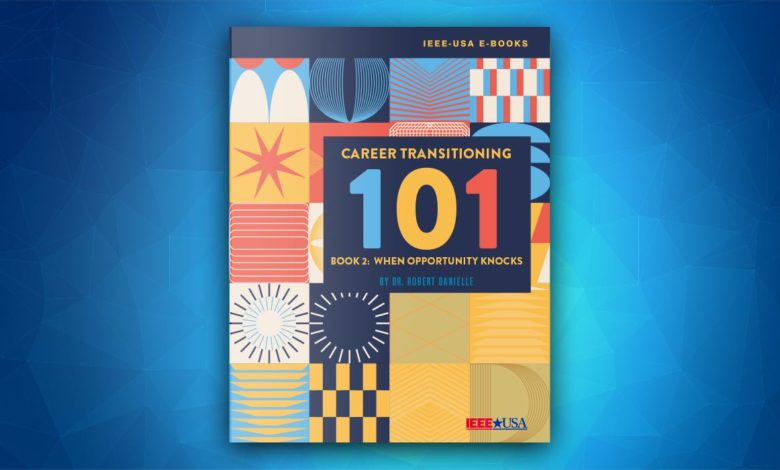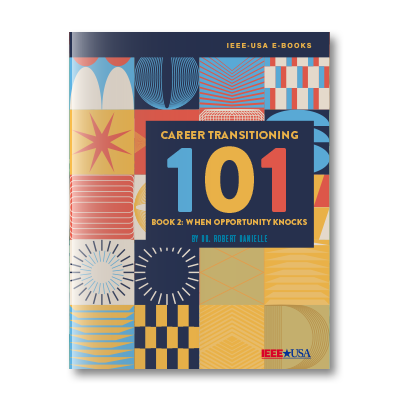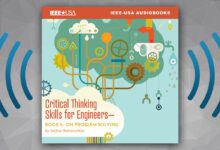
More than 2,000 years ago, the philosopher Seneca observed that luck is what happens when preparation meets opportunity.
Dr. Robert Danielle, who describes himself as a lifelong career transitioner and opportunity seeker, takes the ancient Roman’s statement a step further: Danielle believes that opportunity is everywhere. What’s more, he advises that what matters is identifying what might be an opportunity, gaining a deeper understanding of it, and then putting oneself in a better position to decide whether to pursue it.
A consultant whose work also includes leading large, successful change initiatives and improving individual and team performance, Danielle has just written the second volume in the timely, new IEEE-USA e-book series. IEEE-USA is introducing Career Transitioning 101—Book 2: When Opportunity Knocks, on 1 July — free to all IEEE members. Non-members pay $2.99, at https://ieeeusa.org/shop/.
Dr. Danielle emphasizes that a person considering a career transition or change needs to be aware of the many opportunities available and be prepared to explore them.
“Opportunities surround us,” says the author. To illustrate this point, he recommends thinking about a favorite movie, show or video you’ve watched multiple times. Next, compare the first time you watched it to the times afterward; and whether what you saw, you felt, perceived, or learned differently from the time before.
“Seeing — or recognizing — opportunities can be like that,” Danielle writes. “If you’re distracted, the risk of not seeing opportunities goes up exponentially. Miss out on one, or more, of them and you may find yourself living in a world of what-ifs and regret.”
Danielle recommends two vital components in the search for professional opportunities:
- Identifying and cultivating strategic contacts
- Outworking others and getting noticed.
The first component — developing strategic contacts — is critical because these contacts generate opportunities, sometimes without asking or prodding. Moreover, some 70 percent of all job openings never make it to the public via job postings or job sites, so internal resources who have information about potential employment opportunities are especially important.
The second tactic — outworking others — is exactly what the words imply. The person who always goes above-and-beyond, maintaining a high level of performance and professionalism, is bound to be noticed. This step is not a one-and-done effort; it’s a commitment to doing one’s very best, even when you may not be the best person to
do the job. The author says that, when they were surveyed, nearly two-thirds of the people in a study of this quality said their efforts were a key reason why they thought more opportunities became available to them, even when that wasn’t their intent.
“Opportunities do not always magically appear with signs on them and blinking lights,” writes Danielle. “Finding even a flickering light of passion has the potential to put you on the path of outworking others, getting noticed, and changing your career trajectory.”
In a chapter aptly titled “Lemons to Lemonade,” he discusses the remarkable hobby-into-career phenomenon that was a result of the 2020 COVID pandemic.
“As the pandemic upended and destroyed our job markets, something very interesting started to happen,” the author writes. “It began to create new entrepreneurs, who set up small businesses that had them monetizing their hobbies, skills, interests, experiences and contacts.” The pandemic pushed many people outside their comfort zones to create new products and services that are viable employment opportunities.
Danielle notes that while Yelp, the crowd-sourced online reviewer of businesses, recorded nearly 100,000 business closures during the first eight months of 2020 — it also noted a 10 percent increase in new businesses selling cupcakes, donuts, cakes, and other desserts. In addition, the United States Census Bureau documented a near one-third increase over the previous year, in the number of solo-owned and operated businesses.
“The lessons here not only shine the light on how to adapt to unplanned change,” he writes, “but they also demonstrate the importance of taking an active inventory of your transferable skills.” Danielle adds that while few events can displace the fear of uncertainty, the person who understands who they are, and what their strengths are, can provide the spark to launch a new career path.
For those job changers who opt to send their resumes when applying for a position, he warns that each corporate job offer attracts an average of 250 others seeking that same job. Of those, four to six candidates will be invited to an in-person interview, and only one will get the job. To help unsuccessful job seekers, Danielle suggests a follow up letter requesting feedback about their skills, experience, training, or educational gaps.
He stresses that being transparent and humble about why this information would be helpful to the job seeker can lead to valuable education or training suggestions — and even, perhaps, a new strategic contact with that person.
Dr. Robert Danielle’s career spans professional/career development, leading large, successful change initiatives and improving individual/team performance. He earned his Ed.D. in Higher Education and Organization Change; an M.S. in Information Systems Management; and a B.A. in Leadership — all as an adult learner — with both a family, and demanding, full-time positions.
Helen Horwitz is an award-winning freelance writer who lives in Albuquerque. She was with IEEE from 1991 through 2011, the first nine as Staff Director, IEEE Corporate Communications.







